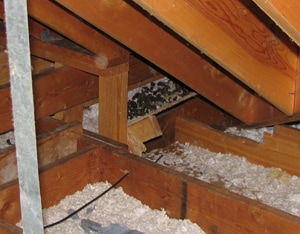Prevention & Control
Baylisascaris infection can be prevented by avoiding contact with raccoons and their feces. Washing your hands after working or playing outdoors is good practice for preventing a number of diseases.
Do not keep, feed, or adopt wild animals, including raccoons, as pets. Infection rarely causes symptoms in raccoons, so you cannot tell if a raccoon is infected by observing its behavior. Roundworm eggs passed in the feces of infected raccoons are not visible to the naked eye. Eggs can only be seen using a microscope.

Raccoons may use sandboxes as a latrine. Keep sandboxes covered when not in use.
You may discourage raccoons from living in and around your home or parks by taking the following steps:
- Prevent access to food
- Keep trash containers tightly closed
- Close off access to attics and basements
- Keep sandboxes covered when not in use (raccoons may use sandboxes as a latrine)
- Remove fish ponds — they eat the fish and drink the water
- Eliminate water sources
- Remove bird feeders
- Clear brush so raccoons are not likely to make a den on your property
Stay away from areas and materials that might be contaminated by raccoon feces. Raccoons typically defecate at the base of or in raised forks of trees, or on raised horizontal surfaces such as fallen logs, stumps, or large rocks. Raccoon feces can also be found on woodpiles, decks, rooftops, and in attics, garages, and haylofts. Feces usually are dark and tubular, have a pungent odor (usually worse than dog or cat feces), and often contain undigested seeds or other food items.
If you have found a raccoon latrine near your home, cleaning the area may prevent possible infection. Newly deposited eggs take at least 2-4 weeks to become infective. Prompt removal and destruction of raccoon feces will reduce risk for exposure and possible infection.
More on: Raccoon Latrine Clean-upCdc-pdf

A racccoon latrine found in an attic. Courtesy of Dr. Shira Shafir.
If you choose to clean the site yourself, care should be taken to avoid contaminating hands and clothes.
- Wear disposable gloves to help prevent cross contamination.
- Wear a N95-rated respirator if working in a confined space to prevent accidental ingestion of eggs or other harmful materials.
- Avoid stirring up dust and debris- you can lightly mist the latrine area with water from a spray bottle to reduce the amount of dust.
- Wear rubber boots that can be scrubbed or cover your shoes with disposable booties that can be thrown away, so that you do not bring eggs into your household.
- Feces and material contaminated with raccoon feces should be removed and burned, buried, or sent to a landfill.
- Most chemicals do not kill roundworm eggs; however, heat kills the eggs instantly.
- Treat feces-soiled decks, patios, and other surfaces with boiling water or a propane torch (please contact your local fire department for regulations and safety practices).
To help further reduce the risk of possible infection, wash your hands well with soap and warm running water. Clean/launder your clothes thoroughly with hot water and detergent.
More on: Handwashing
If you are cleaning an indoor raccoon latrine and are not able to use a propane torch, use a damp (but not wet) sponge to wipe the area with hot soapy water. Rinse your sponge frequently. After you are finished, flush dirty water down the toilet. Place the sponge in a plastic bag and put the plastic bag in the garbage.
Contact your local animal control office for additional assistance.
Dogs
Dogs may be infected with adult B. procyonis roundworms but may not show symptoms. Have all pets de-wormed under a veterinarian’s supervision and take precautions to avoid contact with their feces.
Exotic pets
Raccoons and dogs are not the only hosts of Baylisascaris. B. procyonis infection has also been documented in kinkajous. Other animals such as coatis may be susceptible. When wild animals are kept as pets, there can be a risk of disease transmission to humans.